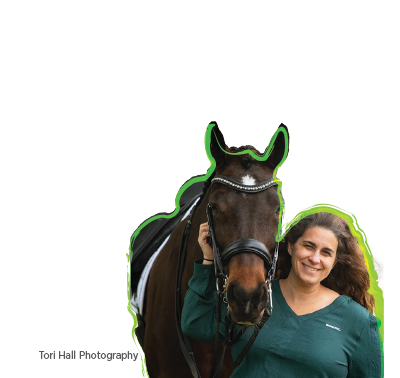

On August 5, 2024, Manfredi, DVM, MS, PhD (MSU ’16), DACVS-LA, DACVSMR (Equine), assumed the duties of the Mary Anne McPhail Dressage Chair in Equine Sports Medicine in the Department of Large Animal Clinical Sciences.

The Mary Anne McPhail Dressage Chair was established in 1997 through the generosity of Mary Anne and Walter McPhail to foster research that will enhance performance and soundness of sport horses, particularly elite dressage horses.
Manfredi first became familiar with the position in 2002 as a visiting summer research student from the Atlantic Veterinary College at the University of Prince Edward Island in Charlottetown, Prince Edward Island, Canada. At MSU, she worked under Hilary Clayton, BVMS, PhD, DACVSMR, FRCVS, the inaugural appointee of the McPhail Chair. Manfredi had followed Clayton’s research on equine sports medicine as a veterinary student. Both women are passionate about equestrian sports—dressage, in particular.
“Dr. Clayton was excited; the project she wanted me to work on involved riding horses and looking at the action of the bit in the horse’s mouth,” explains Manfredi. “She was glad to find a veterinary student who had experience riding.” Manfredi had spent her childhood in New York participating in everything from Pony Club (Meadow Brook Hounds, Graduate C-3), to hunter-jumper shows, as well as eventing and dressage thanks to her riding-instructor mother. During high school she specialized in the area she most enjoyed: dressage.
“I love the beauty of dressage (which means training); the harmony between horse and rider,” she says. “It is so precise. It’s also a good basis for whatever other competitive discipline you want to pursue.”
In the summer 2002 program at MSU, translating her passion to research had an immeasurable impact on her career. It helped that she met extremely supportive Spartans (who would later become her colleagues) such as Dr. Hal Schott and Dr. Betsy Carr.
“I thought, ‘This is amazing; I get to do veterinary medicine AND advanced research. How do I do this full time?’” she says. “I started figuring out how to get back to MSU, and maybe even to the McPhail position. I was bleeding green after my summer here because everyone was so fantastic.”
To eventually reach the McPhail position and best serve performance horses, Manfredi needed a background in benchtop science as well as in clinical equine sports medicine, rehabilitation, and surgery. After earning her veterinary degree, she gained a deeper understanding of anatomy and imaging via an internship at Mississippi State University. From there, she spent a few years in private practice, where she worked with both backyard and high-performance horses, and then dabbled in the regulatory world of sport horses in Illinois. She completed a surgery residency in Minnesota—a program with a heavy sport horse caseload—where she also earned a master’s degree studying osteoarthritis. She has since become a diplomate in large animal surgery as well as equine sports medicine and rehabilitation
Later, as she expanded her research experience, she became a full-fledged Spartan by attaining a PhD in endocrinology in the College’s Comparative Medicine and Integrative Biology Program. In 2017, she became College faculty in the department of Pathobiology and Diagnostic Investigation, where she spent the next few years exploring the interaction of orthopedic and metabolic disease. She is the head of the Equine and Comparative Orthopedic Rehabilitation and Endocrinology (ENCORE) Laboratory at MSU.
All the while, she remained an upper-level competitive dressage rider. Manfredi is a United States Dressage Federation bronze, silver, and gold medalist, having competed through the Grand Prix level.

“Experiences I have as a rider, and the clinical cases I see, inform the research inquiries I have,” she says. Now, she appreciates her new role for how it allows her to serve the riding and dressage communities worldwide. “The McPhail position is a public face to bridge the dressage and equine sports medicine worlds. It’s a way to generate community-engaged research and outreach—working with riders, trainers, judges, and other equine professionals to understand what their needs are, how we can work together to answer their research questions, and then how we can effectively share the results.”
Manfredi intends to continue her research into the connections between metabolic and orthopedic disease, while expanding her studies on rider-horse-tack interactions in order to improve horse welfare, performance, and athletic longevity.
“In addition to my individual laboratory’s pursuits, I look forward to establishing national and international collaborations in order to solve pertinent questions for the dressage and sport horse community,” Manfredi says. “An important part of that is to train and retain veterinary students who are interested in equine medicine to stay within the field.”
Those students are what Manfredi is most proud of.
“I’m passionate about mentoring the next generation of equine clinicians and clinician-scientists. I’ve
been fortunate to have had numerous mentees: undergraduates, DVM students, residents, and PhD students. I’m thrilled with their research findings, which have already positively impacted equine health, and look forward to all the scientific advances we can accomplish together in the future.”
